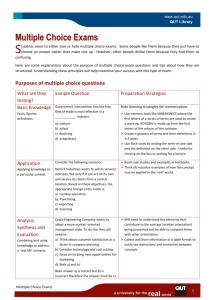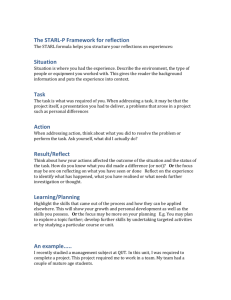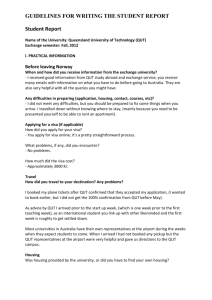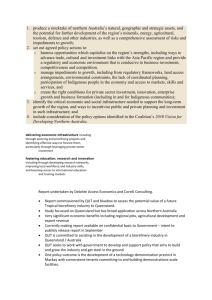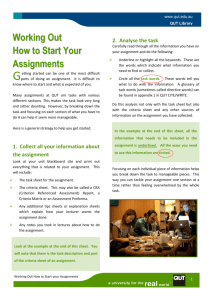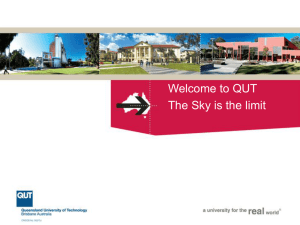QUT - Fall 2013 - BI Norwegian Business School
advertisement
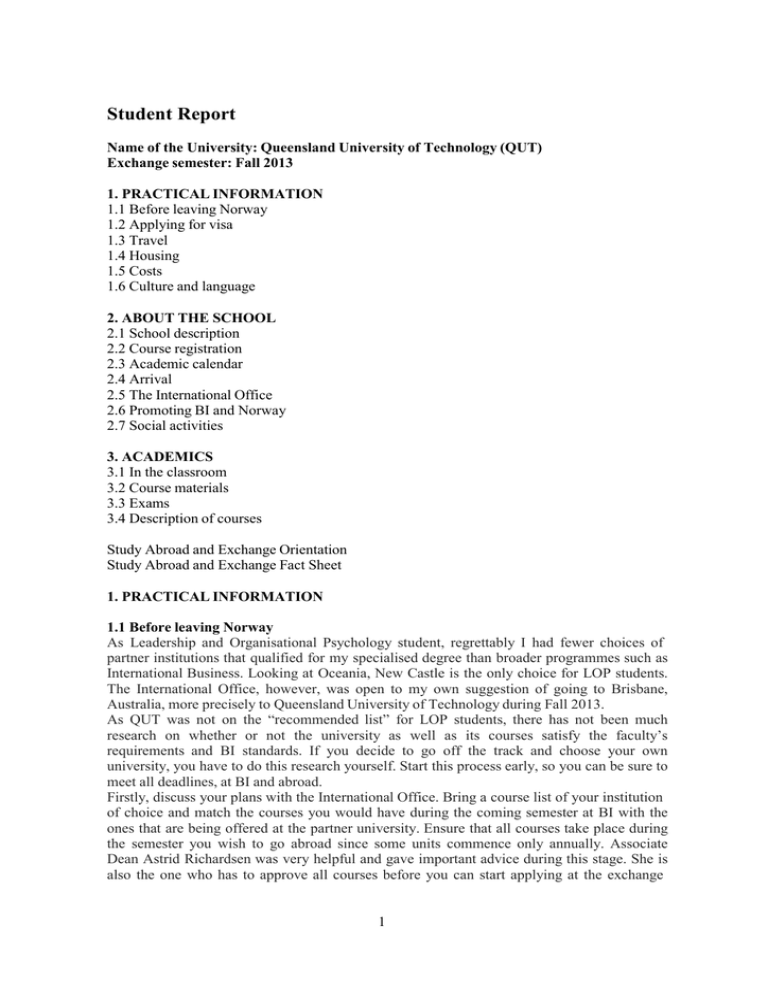
Student Report Name of the University: Queensland University of Technology (QUT) Exchange semester: Fall 2013 1. PRACTICAL INFORMATION 1.1 Before leaving Norway 1.2 Applying for visa 1.3 Travel 1.4 Housing 1.5 Costs 1.6 Culture and language 2. ABOUT THE SCHOOL 2.1 School description 2.2 Course registration 2.3 Academic calendar 2.4 Arrival 2.5 The International Office 2.6 Promoting BI and Norway 2.7 Social activities 3. ACADEMICS 3.1 In the classroom 3.2 Course materials 3.3 Exams 3.4 Description of courses Study Abroad and Exchange Orientation Study Abroad and Exchange Fact Sheet 1. PRACTICAL INFORMATION 1.1 Before leaving Norway As Leadership and Organisational Psychology student, regrettably I had fewer choices of partner institutions that qualified for my specialised degree than broader programmes such as International Business. Looking at Oceania, New Castle is the only choice for LOP students. The International Office, however, was open to my own suggestion of going to Brisbane, Australia, more precisely to Queensland University of Technology during Fall 2013. As QUT was not on the “recommended list” for LOP students, there has not been much research on whether or not the university as well as its courses satisfy the faculty’s requirements and BI standards. If you decide to go off the track and choose your own university, you have to do this research yourself. Start this process early, so you can be sure to meet all deadlines, at BI and abroad. Firstly, discuss your plans with the International Office. Bring a course list of your institution of choice and match the courses you would have during the coming semester at BI with the ones that are being offered at the partner university. Ensure that all courses take place during the semester you wish to go abroad since some units commence only annually. Associate Dean Astrid Richardsen was very helpful and gave important advice during this stage. She is also the one who has to approve all courses before you can start applying at the exchange 1 university. MSc students usually take 24-30 ECTS or equivalent while on exchange. In case some courses are not available, you are required to list courses equivalent to at least 45 ECTS on the Learning Agreement (LA), which you can download from @BI. The LA is then sent to your host university, which accepts or rejects you for the courses you have indicated on the LA, based on your suitability (prerequisites are normally outlined in the course descriptions). Ultimately, I got into the following four units: MGN410 Employment Relations MGN440 HRM Theory and Practice MGN506 Contemporary Issues in Human Resource Management MGN442 Self-Leadership. 1.2 Applying for a visa Once you have been accepted at your host university and are registered for courses, you will receive a Confirmation of Enrolment (CoE), which you need for your visa application. The application and payment are organised online on the Australian Department of Immigration webpage (http://www.immi.gov.au). Here you can also find a pricing estimator and important information about fees, charges and updates on your own application. Concerning costs, the 573-visa for students of higher education costs AUD$535.00. Depending on your home country you have to get a medical check as part of the visa requirements. As German citizen I did not have to do this, but double check for yourself on the Department’s webpage. If you are not a Norwegian or Swedish citizen, you also need to pay for Overseas Student Health Cover (OSHC). This is obligatory for international students applying for a student visa and forms a significant part of your visa costs. QUT cooperates with Mediabank as insurance provider and offers a convenient online pay system for this. The Medibank health cover totals to AUD$290.50 and I was genuinely happy with their services. Be aware that you must organise your OSHC before you leave, otherwise the Department of Immigration can cancel your visa. Your student visa allows you to work up to 20 hours a week during semester and full-time during holidays. Most student visa come with permission to work, if not, you must apply to the Department of Immigration for permission. 1.3 Travel I flew from Frankfurt to Sydney with Cathay Pacific, stopping over in Hong Kong. Both flights are about 10-11 hours, depending on your connections. I personally started my travels late June although the Introduction Week starts only mid-July, so I could adjust to time difference and climate before commencing my studies. Additionally, I recommend booking only a one-way ticket or alternatively a flexible return ticket because you most likely want to travel after your term and there are heaps of opportunities arising with fellow exchange students you cannot foresee when you first plan your trip. 1.4 Housing QUT has its own accommodation office (Gardens Point X Block Level 3) and they are very helpful in finding a place for you. Urbanest for example is located in South Bank, in immediate proximity to QUT (10 minutes walk). The university has a special agreement with Urbanest, where you pay AUD$204/week for a private ensuite room with shared kitchen instead of AUD$255 and up depending on the number of people you share the kitchen with. I visited Urbanest a lot, it is a very decent and secure place to live and located in the most beautiful part of Brisbane. Apart from the higher prices, Urbanest, as well as other student housing organisations, requires you to sign a 6 months contract. In order to get a room, you have to apply for housing pre-departure without having inspected the room and in case you want to move out you either have to find a new tenant yourself or keep on paying rent. 2 Because this was too much risk for me, I chose to live privately. I lived in two places: Firstly in Hawthorne, one of the better areas of Brisbane, where I lived with a host family I met over couchsurfing. This was a great start into the Australian culture and the children took me out partying and dining, so I could make first contacts with locals. However it is a little far out (45 minutes taking the ferry and walking to QUT), so I decided to move to Coorparoo (15 minutes by bus and on foot to QUT), where rent prices are cheaper too. Generally, you should expect rent expenses around AUD$160-200 for a decent place if you look privately. Moving further into the city and increasing house standard will definitely boost rent prices. The cheapest way to live in Brisbane is by sharing your room with other students. 1.5 Costs Costs as per month: Rent AUD$760 But paid weekly Books 0 The library offers all the books you need, some of them only in the nonlending collection. Some units provide e-versions of course books and the article compendium against no charge. If you still wish to buy all course books, there is a bookstore and second-hand book exchange on campus. Mine varied between AUD$74 and AUD$135 (retail prices). Food AUD$150-250 This really depends on your budget, where you shop and how often you eat out. There are heaps of cute cafés and its multicultural cuisine is famous for Brisbane. There is Woolworth, which is a rather high-end supermarket. Coles is still very good but a little bit cheaper. There are also weekly markets (e.g. Queens Market every Wednesday on Queens St.), where you can buy fresh fruits and veggies at a lower rate. There is also Aldi if you are travelling on a budget. Transport AUD$60 Your go card is your Brisbane essential. It can be used on buses, trains and ferries within entire Queensland. You can buy it at 7/11 and other retailers (also on campus) or online. If you register your travel card (www.translink.com.au) you can top up money online. Transportation prices are lower when you travel off-peak and you get 50% concession fare as a student, so make sure you always carry your student ID with you. If you do not, penalties can exceed AUD$200. A nice feature: after 9 rides you travel for free, so you can get a free ride to the Gold Coast on the weekend for instance. AUD$30 Cell phone My provider was Optus and I was very satisfied. I had a pre-paid service that included all calls, texts and 500MB per day, which I never exceeded because all social media apps such as Facebook and Twitter are free anyway. Coverage was always good, except of course you are somewhere in the bush. Travel AUD$300 I aimed at one travel a months so I would see as much as possible of this amazing country even though I was a full-time student. Sometimes it was just a day/weekend trip and sometimes a week or longer, so this indication above should be taken as an average. Living in Brisbane, you have some of the most amazing destinations right at your doorstep (e.g. Fraser Island, North Stradbroke Island, Cairns and the Great Barrier Reef, Sunshine Coast, Gold Coast, Byron Bay, etc.), so I would definitely recommend doing a road trip. 3 Nightlife We booked a Jucy Camper for 4 girls and 5 days to drive to Cairns for approx. AUD$500. Low-cost airlines include Jetstar, Tiger and Virgin. Rental cars are also affordable under the condition that you pick up and drop off the car at the same location (approx. AUD$60/day without one-way fee). AUD$100-200 Wine/beer is about AUD$5-6 in a restaurant/bar. A bottle of cheap wine in one of the liquor stores (BWS, Liquorland) would be about the same price, a decent one will cost at least AUD$10-20. The common exchange student lives off Goon (a red or white 5l cask wine for AUD$12). There is usually no cover in the clubs, although some in the Valley will charge you. Cigarettes are very expensive (AUD$15). Cabs take an excess fee during nights, for a 15 minute cab ride home I paid about AUD$25. 1.6 Culture and language In the very beginning, I had to get used to Australian accent. Especially when people were not from the urban areas of Australia I had to ask them to repeat their sentence, which they happily did. They use some Aussie specific words I did not know before but during Intro Week we had some playful activities to get to know such country-specificities. QUT also offers language courses throughout the semester. It is crucial to take part in all the social events that are offered during Intro Week such as the River Cruise and the Island Dreaming Orientation Camp on North Stradbroke Island, but also during the semester to meet people you study with or you might want to travel with, and to enhance your language skills. Brisbane and Australia in general is a very international place, which made my experience abroad very multifaceted and interesting, however, it was also hard to make contact with Australians. Living in an Australian family in the beginning made it significantly easier to touch base with locals. Overall, the culture is quite close to ours in terms of social dos and don’ts, so I did not have much of a culture shock. 2. ABOUT THE SCHOOL 2.1 School description QUT is one of three bigger universities in the wider Brisbane area with approximately 40,000 students, including 6,000 from overseas. It comprises three campuses: Kelvin Grove, Caboolture and Gardens Point. The business faculty is located at the Gardens Point campus, which is sited right in the Botanic Gardens (perfect for relaxing study breaks). The Gardens Point campus is also only 5 minutes walk from the city centre and right next to the Brisbane River with a separate ferry landing. QUT offers undergraduate, postgraduate and PhD programmes and has a strong research focus. Many of their staff have received international awards for their teaching initiatives, research collaborations and publications, including Nobel Peace Prize-winning scientist Dr. Richard Conant who joined QUT in 2010. The university has also been ranked Australia’s top young uni in the Times Higher Education Top 100 Under 50 (June 2013). Despite its strong research side, QUT also promotes itself as “the university of the real world”, which underpins resilient ties to the industry, naming cooperations with Microsoft, Boeing, Coca Cola and Ernst & Young as only few examples. The percentage of working people in the postgraduate units are higher than at BI, so most of my classes were evening classes from 6 to 9 p.m. Usually, classes do not have mandatory attendance, whilst most of the tutorials require you to sign an attendance sheet. In Australia, marks are given on a 7-point scale, 7 being a High Distinction grade and 4 the lowest passing grade. 4 2.2 Course registration After BI and your host university approved your courses, you can register for them online on the QUT Virtual webpage. Be aware that there is a deadline to do this, which can vary. In my case the following key dates applied: - 10 December 2012 – 2 August 2013: Enrolment opens - 17 May 2013: Expected release of timetable - 3 June 2013: Enrolments/class registration - 7 June 2013 & 5 July 2013: Final date for accepting applications from international students - 5 July 2013: On-time closing date for international student change of major applications. No late applications accepted. - 2 August 2013: Last date students can add units to their enrolment programme without incurring any penalty - 3 August – 16 August 2013: Students are permitted to add units with payment of AUD$50 penalty - 16 August 2013: Census date (final date for cancellation of units without incurring financial penalty; final date for cancellation of course with a partial refund (50%) of international student tuition fee; withdrawal after this date will incur full fees) Courses fill up early, so do not wait until last minute. For me it was crucial to be quick, as the four courses listed approve were the only ones BI and QUT approved of, so not getting into one of these had meant to retake units after returning to BI. 2.3 Academic calendar Arrival date: First day of the semester: Last day of classes: Examination period: Any special events/holidays: Other: 26 June 2013 22 July 2013 16 November 2013 2 November – 16 November 2013 15 July – 19 July 2013: Orientation week 30 September – 4 October 2013: Mid-semester vacation 7 October 2013: Labour Day 23 September 2013: Final exam timetables released 2 December 2013: Release of semester results 2.4 Arrival The International Office deals with an extreme amount of international students each term, so they are very professional and well-organised. You can manage your Intro Week yourself online with the Orientation Planner. There is a multitude of events you can include in your personal schedule, such as official welcomes, information sessions about sports clubs and committees, study abroad info sessions, how to find work and accommodation and many more. There was also a river cruise and an orientation camp on North Stradbroke Island, which you have to book pre-departure, as well as free T-shirts and free lunches. There are also faculty-specific events like the Business Mixer, where I made contact with fellow business and HRM students as well as industry representatives. 2.5 The International Office All members of the team were super helpful and efficient in problem-solving. They are empathetic and understand the concerns and issues of international students very well, so if I had any problems I just walked into their office in A block or wrote an email, which they responded to in less than 24 hours. They also work closely with other departments such as the 5 accommodation office, so even if they cannot deal with your problems directly they always know the right person to go to. Before I left Europe, the International Office had already sent me plenty of information material, they even offer free pick-ups from the airport. The International Office was kindly supported by a handful of exchange buddies, who also organised some social events, showed us around Brisbane and were always available to answer questions. 2.6 Promoting BI and Norway I joined the NORSK student association, which is the single largest non-Australian student society in Brisbane. Through a variety of social events like barbeques, Halloween parties and large-scale pub crawls, all members of this society pass on a notion of Norwegian culture and customs to the southern hemisphere. As a German student living in Norway, I could convey a neutral stance of the benefits of studying in Oslo in university-related conversations with the International Office, fellow students and friends. 2.7 Social activities QUT is very rich in social activities and interaction. As exchange students the first people you will meet are fellow international students and since most of them will have them same interests (e.g. travel, party), you will also spend most time with them. To get to know and do social activities with native students you have to actively seek contact with them, for example by asking them to work on a group project together or by working in an Australian business. In one of my units I worked with fours Australians and this was the best group works I had during my semester abroad because they were social, polite and valued my input as a foreigner. Most of the social activities I already outlined and basically you can find one each day. We had a weekly barbeque either in South Bank or in Kangaroo Point, climbing at Kangaroo Point, kitesurfing with one of our fellow exchange students who opened a kite school, gatherings in the Botanic Bar on campus, official events organised by QUT such as catch-up functions, farewell functions and an international graduation ceremony. Another student society called East West Eats tours through Brisbane to experience food from all over the world. There was also a Frisbee club, a running club, a surfing club, a Dragon Boat competition, trips to the Lone Pine Koala Sanctuary and the Currumbin Wildlife Sanctuary, and so much more. Life never got boring in Brisbane. 3. ACADEMICS 3.1 In the classroom As “university of the real world”, the teaching style is more practice-oriented than at BI, where we work more research-based. On the one hand, I really enjoyed learning more about employment law, trade unions, etc., as I felt I did not know enough about it. On the other hand, everything you learn concerns Australian law and employment situations. The interaction with lecturers is very informal on first-name basis and you can speak in class without being picked on. Although it is not mandatory to come to classes, it is expected of you to do the readings before each class and stay up-to-date with additional readings that are posted each week on QUT Blackboard. Lecturers also have office hours to help with assignments or any other questions you might have. All my classes were very individual. One of them was the typical Powerpoint slide sort of lecture, which was interrupted by three workbook exercises about an imaginary organisation on which we had to apply the course content. Another class had additional tutorials to deepen the knowledge we gained during 6 lectures. My third class was a virtual class, where we had weekly meetings in an online classroom. Lastly, I had one unit that did not have any agenda at all; the course of this unit was rather determined by the class’ interests in contemporary issues in HRM, what was on the news and what we thought would be an issue in future. The level of work was in general a bit easier than at BI, although more assignments, quizzes, presentations and exams had to be completed. This type of teaching kept me constantly busy and after all increased my learning outcome because I was tested on several occasions with different methods instead of only writing one 100% exam. 3.2 Course materials Course materials were different from class to class. Two of my units had prescribed readings and the other two were mainly based on current topics and articles. All lecturers worked with Powerpoint slides, although half of them did not rely on them as main means of teaching but rather summarised key dates and deadlines on them. The materials were new editions, so all content taught was highly relevant. You can access your course materials on QUT Blackboard or through the library. The library provides a comprehensive online system to place and renew books loans and the librarians are very supportive as well. The selection of books and media files at QUT is a lot wider than BI’s and the level of technology use is similar. There are several computer labs and printing services, which can also be maintained and recharged online. The IT department ensures operability of all technological devices and also help you with your own. You can also access your course materials via an app. 3.3 Exams Exams were based on both course materials and lectures. In detail, the classes were evaluated as follows: 1.) MGN410 Employment Relations: Assessment name: Online Quizzes (Optional) Description: Your knowledge of the previous week's theoretical material and your ability to apply it to an employment situation are tested either by using a simple employment scenario similar to those used in tutorial exercises, or through a series of multiple choice questions. Compulsory or Optional: Optional Length/Duration: 30-45 minutes Formative or Summative: Formative and Summative Relates to objectives: Unit objectives: 1, 2, 3, 4 and AOL goals: KS (1.1), CTA (2.1), SEU (5.1) Weight: 25% Internal or external: Internal Group or individual: Individual Due date: Weeks 3-12 Assessment name: End-semester Exam (Compulsory) Description: The examination will cover all aspects of the unit. The format of the exam will be 4 short answer questions + 1 integrative essay. Compulsory or Optional: Compulsory Length/Duration: 2 hours + 10 minutes perusal time Formative or Summative: Summative Relates to objectives: Unit objectives: 1, 2, 3, 4 and AOL goals: KS (1.1), CTA (2.1), SEU (5.1) Weight: 50% 7 Internal or external: Internal Group or individual: Individual Due date: Week 13 in class Assessment name: Case Study (Optional) Description: Using a specific case study you are to undertake a comprehensive consideration of matters occurring in relation to ER at that workplace. Several separate issue topics are available each with separate submission dates, outlined in the week 1 document. You are required to select only one. Compulsory or Optional: Optional Length/Duration: 1,250 words + reference list Formative or Summative: Formative and Summative Relates to objectives: Unit objectives: 1, 2, 3, 4 and AOL goals: KS (1.1), CTA (2.1), PC (3.1) Weight: 25% Internal or external: Internal Group or individual: Individual Due date: Various Assessment name: Research Essay (Optional) Description: Using theoretical material discussed in the unit, you are to research one of the essay questions outlined in the week 1 document. There are both Australian and internationally-focused topics and students may select any option. Compulsory or Optional: Optional Length/Duration: 2,500 words + reference list Formative or Summative: Formative and Summative Relates to objectives: Unit objectives: 1, 2, 3, 4 and AOL goals: KS (1.1), CTA (2.1), PC (3.1), SEU (5.1) Weight: 50% Internal or external: Internal Group or individual: Individual Due date: Various 2.) MGN440 HRM Theory and Practice: Assessment name: Critique (Written) Description: The critique permits you to reflect on decisions made in the project (living case) and to evaluate the extent to which decisions support the intended business strategy and desired organisational culture. Length/Duration: 1,000 words Formative or Summative: Summative Relates to objectives: Unit objectives: 1, 2, 3 and AOL goals: KS (1.1), CTA (2.1), PC (3.1) Weight: 20% Internal or external: Internal Group or individual: Individual Due date: Week 12 Assessment name: Final Examination Description: The exam may consist of essay, short answer and/or case type questions. The exam will sample a range of content covered through the entire semester. Additional details will be advised in the final weeks of class. Length: 2 hours + 10 minutes perusal 8 Formative or Summative: Summative Relates to objectives: Unit objectives: 1, 2, and AOL goals: KS (1.1), CTA (2.1) Weight: 40% Internal or external: Internal Group or individual: Individual Due date: Central Exam Period Assessment name: Case Study Description: A group project on a living case study requiring decision making/action taking and analysis of decisions designed to develop your knowledge of key concepts, research, critical analysis and writing skills. Marks incorporate self and peer assessment of group processes. Length/Duration: 2,000 words (excluding references and executive summary) Formative or Summative: Formative and Summative Relates to objectives: Unit objectives: 1, 2, 3, 4, 5 and AOL goals: KS (1.1), CTA (2.1), PC (3.1), TW (4.1) Weight: 40% Internal or external: Internal Group or individual: Group Due date: Weeks 6, 9 & 11 3.) MGN442 Self-Leadership: Assessment name: Essay Description: Discuss a specific area of self-leadership drawing on the relevant literature and use this knowledge to identify the implications for contemporary human resource practice. Length/Duration: 1,500 words Formative or Summative: Formative and Summative Relates to objectives: Unit objectives: 1, 4 and AOL goals: KS (1.1), KS (1.2), CTA (2.1), PC (3.1), SEU (5.1). Weight: 40% Internal or external: Internal Group or individual: Individual Due date: Week 7 Assessment name: Portfolio Description: You will develop the self-leadership skills portfolio throughout the course of the unit. The portfolio will contain both self-reflection and feedback from others. You will conduct an analysis of your skills, strengths and areas for improvement and will develop an action plan for skills development. Length/Duration: 2,500 words Formative or Summative: Summative Relates to objectives: Unit objectives: 1, 2, 3, 4, 5 and AOL goals: KS (1.2), PC (3.1), CTA (2.1), SEU (5.1) Weight: 60% Internal or external: Internal Group or individual: Individual Due date: Week 13 9 4. MGN506 Contemporary Issues in Human Resource Management: Assessment name: Workshop Description: In a small group, you will develop and deliver a workshop on a contemporary HRM issue. Your group will introduce a contemporary issue impacting on the HR profession and lead a class discussion on the possible implications of the issue. This assessment incorporates a peer review. Marks will incorporate self and peer assessment of group processes. Length/Duration: 1-hour presentation Formative or Summative: Formative and Summative Relates to objectives: Unit objectives: 1, 2, 3, 4 and AOL goals: KS (1.1), KS (1.2), CTA (2.1), PC (3.1), (3.2), TW (4.1), SEU (5.1) Weight: 40% Internal or external: Internal Group or individual: Group Due date: Weeks 12 & 13 Assessment name: Report Description: Choose a recent business book, which you believe highlights material of strategic significance for the Human Resource profession. Prepare a written review on the implications of the book's ideas for the role and practice of HRM. Length/Duration: 1,500 words Formative or Summative: Formative and Summative Relates to objectives: Unit objectives: 1, 2, 3, 4 and AOL goals: KS (1.1), CTA (2.1), PC (3.1), SEU (5.1) Weight: 30% Internal or external: Internal Group or individual: Individual Due date: Week 7 Assessment name: Critique (written) Description: Write a critique of assigned workshop papers, identify and evaluate the potential impact of the emerging issue for the Human Resource profession. Length/Duration: 1,500 words Formative or Summative: Summative Relates to objectives: Unit objectives: 1, 2, 3, 4 and AOL goals: KS (1.1), CTA (2.1), PC (3.1) Weight: 30% Internal or external: Internal Group or individual: Individual Due date: Central Exam Period 3.4 Description of courses Course code Master/ & name Bachelor MGN410 Master Employment Relations Exam form 2-hours written exam + perusal Prerequisites None 2,500 words research 10 Approved as Elective Comments Dr. Robin Price is one of the leading researchers in her field. She also organised a guest speaker on discrimination in Australia. For Europeans it might not be essay MGN440 HRM Theory and Practice Master 2-hours written exam + perusal None Elective None Elective None Elective 1,000 words critique 2,000 words case study MGN442 Self- Master Leadership 1,500 words essay 2,500 words portfolio MGN506 Master Contemporary Issues in HRM 1-hour group presentation 1,500 words report 1,500 words critique the most relevant course, since it mostly deals with Australian law and trade unions, but it still gives a general insight in the subject and the research articles presented in this course were particularly interesting. A course about the basics of HRM. There is nothing really new, but you repeat all the essentials (recruitment, selection, etc.), however, the application to an imaginary organisation was rather challenging. Our lecturer demonstrated industry knowledge and great teaching skills. The format of virtual classes was new to me but I am surprised how well the students participated without having face-to-face contact. Self-leadership in my eyes is underrated as university subject, because it is rather a soft skill. However, I strongly feel that it would fit into BI’s curriculum as well. My favourite subject this term. This lecture was insightful and demanding at the same time, as it did not have a fixed course agenda. Our comments and opinions shaped the course. The lecturer was extraordinary and required the students to develop big picture thinking and analytical abilities. How will you sum up the exchange experience? (This may be used in future exchange brochures) The land of sunshine, kangaroos and barrelling waves has in fact more to offer than just that. Brisbane and QUT showed me how the social and joyful Australian way of life goes hand in hand with scholastic excellence, outstanding research and technological progression. Ultimately, both of these sides will benefit my life and career paths: the academic side that has broadened my skills portfolio and technical knowledge, and the social side that has refined my cultural sensitivity, open-mindedness and gratitude. 11 STUDY ABROAD AND EXCHANGE ORIENTATION Second Semester 2013 Orientation – Tuesday 16 July 2013 The orientation includes the Official Welcome followed by sessions covering: enrolment, immigration matters, computing access & password, email and more. Attendance is compulsory. Further orientation information will be emailed out the month before the semester starts. BRISBANE RIVER CRUISE Second Semester 2013 – Tuesday 16 July 2013 We encourage you to attend the "Welcome to Brisbane" River Cruise. A great way to meet and get to know fellow students (including staff) in the study abroad and exchange programs. This cruise incurs an additional cost of approximately AUD$35.00 per person (Subject to change). ORIENTATION CAMP 2nd Semester: Island Dreaming, Orientation Camp Friday 19 July – Sunday 21 July 2013 The Study Abroad and Exchange Unit hosts an optional three day orientation weekend at a select location close to Brisbane. The orientation escape is the ultimate way to begin studies down under with learn to surf lessons, sea kayaking and beach hikes. Enjoy a spectacular sunset, get to know other study abroad students and experience Australia’s natural beauty. This camp incurs an additional cost of approximately AUD$340.00 per person (subject to change). 6. Choosing Subjects /Modules Selecting subjects: To select the subjects you would like to study at QUT, refer to Unit Synopsis: http://www.student.qut.edu.au/studying/units (Use the Drop Down Boxes on top) Or the Exchange Subject Directory: http://www.qut.edu.au/international/study-abroadand-exchange/subjects-you-can-study/pre-approved-subjects To search for subjects by semester, or description use https://qutvirtual.qut.edu.au/portal/pls/portal/unout_search_p.show Alternatively, you can use the QUT Study Finder http://www.studyfinder.qut.edu.au/cgibin/WebObjects/StudyFinder Choose at least eight (8) subjects per semester. Students should discuss their subject choices with their academic adviser at their home institution before applying to QUT. The university advisers will be able to ascertain if the subjects students intend to study at QUT correspond with the home institution's degree requirements. Subject Prerequisites Students must be reminded that when selecting subjects at QUT, it is important to remember that most subjects above first-year introductory have prerequisites which must be satisfied before admissions will be approved. If the student wish to undertake second, third or fourth year level subjects, the School or Faculty will look at their academic record from their home institution to determine whether they have passed courses comparable in content to those QUT subjects which are specified as prerequisite. Ultimately, it is the student’s responsibility to make sure that they meet any prerequisites and that they feel confident that they will be able to successfully complete the subjects. At the Study Abroad and Exchange Orientation, students will be able to meet with Faculty representatives who will be able to discuss subject choices and confirm that pre-requisites have been met. Co-requisites In some cases subjects have co-requisites, which mean they are designed to be taken in conjunction with another subject. Workload As an international student, Immigration Regulations requires you to be enrolled as a full-time student, i.e. undertake a minimum of 36 credit points. Most QUT subjects are offered in 12 credit point units, and most students enrol in four (4) subjects as a standard workload. As mentioned above, when applying to QUT, we strongly recommend that students nominate at least eight subjects in case some of these are not approved for study. Some subjects may not be offered in the preferred semester of study or the prerequisite may not have been met. Changing Subjects Students are able to change subjects on arrival at QUT, provided they meet the prerequisite and have obtained the QUT course adviser's permission to do the subject. It is equally important that students have the approval of their home institution as failure to do so might result in difficulties in having the subject credited back to their home institution. Students have until the second week of classes to change their subjects as many times as they like (subject to QUT Faculty approval and approval from the home institution) Credit Transfer On completion of the semester or year at QUT each student will be provided with an official transcript. 7. HOUSING INFORMATION QUT recognises that accommodation is a high priority for new international students. Accommodation options for students include student apartments, shared houses and apartments or home stay for those who prefer to live in a family environment. We recommend that Study Abroad and Exchange students seek furnished accommodation to avoid incurring additional setting-up expenses for furniture, kitchenware, linen etc. As most students in the Study Abroad and Exchange Programs are here for the maximum of 16 weeks, students must ensure that they do not commit to a lease of more than 6 months otherwise breaking this agreement can be costly. Please note that there are some changes to the recommended accommodation options for 2012 refer to: http://www.student.qut.edu.au/international/accommodation-and-homestay AIRPORT PICK UP AND RECEPTION Whether you have arranged permanent or temporary accommodation, QUT has an airport reception service refer to: http://www.student.qut.edu.au/international/airportreception 8. SPECIAL EVENTS / PLANNED ACTIVITIES See Orientation website: http://www.student.qut.edu.au/enrolment-and-orientation/orientation. Day trips organised by International Student Service http://www.eastwest.qut.edu.au/ 9. COMPUTER/INTERNET ACCESS Everything you need to know about computing at QUT: http://www.ithelpdesk.qut.edu.au/ 10. MONEY AND BANKING ADVICE All QUT campuses are services by automatic teller machines that cater for cards from most banks. All banks have offices in the city and branches in the suburbs. x x x x x Suncorp Metway - www.suncorpmetway.com.au (offers a "direct access" account which allows transaction fee exemption for students. Commonwealth Bank of Australia - www.commbank.com.au National Australia Bank - www.national.com.au ANZ - www.anz.com.au Westpac - www.westpac.com.au When opening an account student’s will need to show their passport and some form of ID. Make sure they tell the bank that they are a full-time student and always ask about what bank fees are charged. There will be no problems changing foreign currencies or cash at almost any bank or exchange bureau. Travellers Cheques generally get a better rate than cash, though banks take out a commission. Credit cards (particularly Visa and MasterCard) are widely accepted (and pretty much compulsory if you're going to rent a car), and ATMs all over the country accept credit and Cirrus cards. 11. LOCAL TRANSPORTATION INFORMATION Full-time students are eligible for fare discounts for buses, trains and ferries. Frequency of service increases during peak hours (7.00-9.00 am and 4.00-6.00 pm) and reduces during weekends, public holidays and off-peak hours. http://www.qut.edu.au/study/student-life/life-in-brisbane/climate-food-and-transport If students are going to study in different campuses there are free Shuttle Service available: http://www.fmd.qut.edu.au/campus_services/shuttle/ 12. SUGGESTED READING - AUSTRALIA http://www.lonelyplanet.com/destinations/australasia/australia/ http://www.australia.com More information on living in Brisbane can be obtained from: http://www.visitbrisbane.com.au/ http://www.lonelyplanet.com/dest/aust/brisbane.htm Preparing for student life - costs etc. http://www.student.qut.edu.au/studying/student-life/life-in-brisbane/cost-of-living 13. HEALTHCARE FACILITIES FOR STUDENTS http://www.healthservices.qut.edu.au/ 14. STUDENT EMPLOYMENT REGULATION http://www.student.qut.edu.au/international/employment 15. GUIDE TO TRAVELLERS – KNOW BEFORE YOU GO! http://www.customs.gov.au/webdata/resources/files/GuideForTravellers.pdf Queensland University of Technology (QUT) Study Abroad and Exchange Fact Sheet Contacts: Address Study Abroad and Exchange Office International and Student Mobility Room A111, Level 1 A Block Gardens Point Campus Queensland University of Technology 2 George Street, Brisbane Qld 4000, Australia Study Abroad and Exchange Website http://www.qut.edu.au/international/study-abroad-and-exchange Primary Email Address Head of QUT International International and Student Mobility Telephone/Email International Student Mobility Telephone/Email Exchange Coordinator Telephone/Email Outbound Exchange Officer Telephone/Email International Student Mobility Officer Telephone/Email Study Abroad and Exchange Officer Telephone/Email Study Abroad and Exchange Officer Telephone/Email Study Abroad and Exchange Officer Telephone/Email Study Abroad and Exchange Assistant Telephone/Email stae@qut.edu.au (Mr) Ray Kelly Executive Director, QUT International (Mr) Geoff Edmondson Director, International and Student Mobility +617 3138 4156 (Ms) Nicole Patterson Manager, International Student Mobility +617 3138 2814 nicole.patterson@qut.edu.au (Mr) Chung Yiu International Student Exchange Coordinator (Acting) +617 3138 5075 yauchung.yiu@qut.edu.au (Ms) Tanya Gomez QUT Outbound Exchange +617 3138 1217 tanya.gomez@qut.edu.au (Mr) Alemania (Febs) Ierome Student Mobility and Short Term Program +617 3138 8340 a.ierome@qut.edu.au (Ms) Dianne Farley Inbound Area: Germany, Scandinavia and Austria +617 3138 4300 d2.farley@qut.edu.au (Ms) Natalie Pye Inbound Area: Americas (North and South), Canada +617 3138 7466 n.pye@qut.edu.au (Mr) Chung Yiu Inbound Area: Asia, Europe +617 3138 5075 yauchung.yiu@qut.edu.au (Ms) Janette Yuen Inbound and Outbound General Enquiries +617 3138 2200 j1.yuen@qut.edu.au (Ms) Hella Sharley Agreements Contact for Agreement Telephone/Email g.edmondson@qut.edu.au +617 3138 8358 partneragreement@qut.edu.au Last updated 1 March 2013 Queensland University of Technology (QUT) Study Abroad and Exchange Fact Sheet Student Exchange Information: Application Deadline Semester 1 (February - June): 1 December each year Semester 2 (July – November): 1 May each year Choosing Units Undergraduate unit codes usually end in a B and postgraduate unit codes generally end in a N or P. Required Documents x x x x x x Home University Academic Record (grades), in English; Copy of your undergraduate degree (for postgraduate applications); and Evidence of English language proficiency (if required). Nomination Letter/Email from home institution (Exchange Student Only) Copy of Passport Personal Information Page (Bio-page) A copy of your current enrolment http://www.immi.gov.au/students/students/chooser/ (Student Visa; Non-award, Subclass 575) OSHC – Visa Requirement (except Belgian and Norwegian and some Swedish who are covered by the CSN International (Swedish National Board of Student Aid) or by Kammarkollegiet (the Swedish Legal, Financial and Administration Agency) – Australian Government, Department of Health and Ageing. Visa Overseas Students Health Cover (OSHC)/Insurance/Health Cover Students need to pay QUT the OSHC Fee (stated on the Offer Letter), so that QUT can organise it for the student. Health Cover http://www.qut.edu.au/international/study-abroad-andexchange/predeparture/health-cover Step-by-step Guide http://www.qut.edu.au/international/study-abroad-andexchange/applying/inbound-exchange/applying-step-by-step-guide Student Services and Amenities Fee http://www.student.qut.edu.au/fees-and-finances/study-costs/fee-schedule/table-lstudent-services-and-amenities-fee (Not applicable to Study Abroad and Exchange students - 7th Aug 2012. Subject to Change). Accommodation/Arrival/Orientation Accommodation http://www.qut.edu.au/international/study-abroad-and-exchange/qut-andbrisbane/accommodation Airport Reception http://www.qut.edu.au/international/study-abroad-andexchange/predeparture/airport-reception Orientation http://www.student.qut.edu.au/enrolment-and-orientation/orientation Cost of Living http://www.student.qut.edu.au/studying/student-life/life-in-brisbane/cost-ofliving Credit Points Minimum Load Normal Load Approximate credit point translations are: 36 CP (3 units, 12 CP/ Unit) (Full time Load) 48 CP (4 units) (Standard Load) 12 credit points = 3 or 4 credits in the US system 12 credit points = 7.5 ECTS in the European system Last updated 1 March 2013 Queensland University of Technology (QUT) Study Abroad and Exchange Fact Sheet Grading System LEGEND 7pt Scale QUT 91/1 - Current Pass Parameters** 7 High Distinction 7 - High Distinction: 85%-100% 6 Distinction 6 - Distinction: 75%-84% 5 Credit 5 - Credit: 65%-74% 4 Pass 4 - Pass: 50%-64% 3 Fail 3 - Marginal Fail: 40%-49% 2 Fail 2 - Fail: 25%-39% 1 Low Fail 1 - Low Fail: Less than 25% Grade Point Average (GPA) The Grade Point Average (GPA) is calculated from the grades obtained and weighted by the credit points of the subject using the formula and assumptions as described in the QUT Handbook ** The percentages below constitute standard result parameters, but may be changed at the discretion of the executive dean or delegated faculty officer. Attendance and Examination Lecture 2 Hours (*Some specific unit may have a higher number of contact hours) Tutorial 1 Hour (*Some specific unit may have a higher number of contact hours) Final Examination Unit Outlines http://www.student.qut.edu.au/about/key-dates-and-academic-calendar/academiccalendar https://qutvirtual.qut.edu.au/portal/pls/portal/unout_search_p.show_public Useful Websites QUT International http://www.qut.edu.au/international/ Entry Requirements http://www.qut.edu.au/international/study-abroad-and-exchange/applying Pre-Approved Units http://www.qut.edu.au/international-students/study-abroad-andexchange/subjects-you-can-study/pre-approved-subjects Units Academic Calendar International Student Services http://www.student.qut.edu.au/studying/units http://www.student.qut.edu.au/about/key-dates-and-academic-calendar/academiccalendar http://www.student.qut.edu.au/international Last updated 1 March 2013
